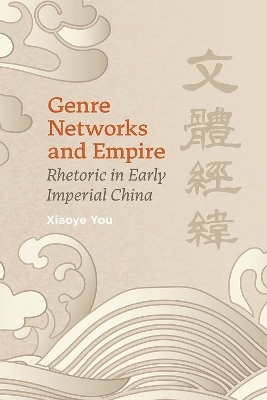
Genre Networks and Empire
Rhetoric in Early Imperial China
Seiten
2023
Southern Illinois University Press (Verlag)
978-0-8093-3897-9 (ISBN)
Southern Illinois University Press (Verlag)
978-0-8093-3897-9 (ISBN)
A decolonial reading of Han Dynasty rhetoric reveals the logics and networks that governed early imperial China. In Genre Networks and Empire, Xiaoye You integrates a decolonial and transnational approach to construct a rhetorical history of early imperial China.
A decolonial reading of Han Dynasty rhetoric reveals the logics and networks that governed early imperial China.
In Genre Networks and Empire, Xiaoye You integrates a decolonial and transnational approach to construct a rhetorical history of early imperial China. You centers ancient Chinese rhetoric by focusing on how an imperial matrix of power was established in the Han Dynasty through genres of rhetoric and their embodied circulation, and through epistemic constructs such as the Way, heaven, ritual, and yin-yang.
Through the concept of genre networks, derived from both ancient Chinese and Western scholarship, You unlocks the mechanisms of early Chinese imperial bureaucracy and maps their far-reaching influence. He considers the communication of governance, political issues, court consultations, and the regulation of the inner quarters of empire. He closely reads debates among government officials, providing insight into their efforts to govern and legitimize the regime and their embodiment of different schools of thought. Genre Networks and Empire embraces a variety of rhetorical forms, from edicts, exam essays, and commentaries to instruction manuals and memorials. It captures a range of literary styles serving the rhetorical purposes of praise and criticism. In the context of court documentation, these genre networks reflect systems of words in motion, mediated governmental decisions and acts, and forms of governmental logic, strategy, and reason.
A committed work of decolonial scholarship, Genre Networks and Empire shows, through Chinese words and writing, how the ruling elites of Han China forged a linguistic matrix of power, a book that bears implications for studies of rhetoric and empire in general.
A decolonial reading of Han Dynasty rhetoric reveals the logics and networks that governed early imperial China.
In Genre Networks and Empire, Xiaoye You integrates a decolonial and transnational approach to construct a rhetorical history of early imperial China. You centers ancient Chinese rhetoric by focusing on how an imperial matrix of power was established in the Han Dynasty through genres of rhetoric and their embodied circulation, and through epistemic constructs such as the Way, heaven, ritual, and yin-yang.
Through the concept of genre networks, derived from both ancient Chinese and Western scholarship, You unlocks the mechanisms of early Chinese imperial bureaucracy and maps their far-reaching influence. He considers the communication of governance, political issues, court consultations, and the regulation of the inner quarters of empire. He closely reads debates among government officials, providing insight into their efforts to govern and legitimize the regime and their embodiment of different schools of thought. Genre Networks and Empire embraces a variety of rhetorical forms, from edicts, exam essays, and commentaries to instruction manuals and memorials. It captures a range of literary styles serving the rhetorical purposes of praise and criticism. In the context of court documentation, these genre networks reflect systems of words in motion, mediated governmental decisions and acts, and forms of governmental logic, strategy, and reason.
A committed work of decolonial scholarship, Genre Networks and Empire shows, through Chinese words and writing, how the ruling elites of Han China forged a linguistic matrix of power, a book that bears implications for studies of rhetoric and empire in general.
CONTENTS
Figures
Abbreviations
Dynasties of Early China
Introduction
1. Genre Networks as a Political Institution
2. Reading the Heavenly Mandate
3. Regulating the Inner Court
4. Weighing the Ways of Government
5. Defending Imperial Integrity
6. Praising and Criticizing as Entertainment
Conclusion: Limits of the Genre Network
Notes
Appendix: Genres Discussed in the Book
Works Cited
| Erscheinungsdatum | 31.01.2023 |
|---|---|
| Zusatzinfo | 4 illustrations |
| Verlagsort | Carbondale |
| Sprache | englisch |
| Maße | 152 x 229 mm |
| Gewicht | 476 g |
| Themenwelt | Sachbuch/Ratgeber ► Beruf / Finanzen / Recht / Wirtschaft ► Briefe / Präsentation / Rhetorik |
| Geisteswissenschaften ► Geschichte ► Regional- / Ländergeschichte | |
| Geisteswissenschaften ► Sprach- / Literaturwissenschaft ► Sprachwissenschaft | |
| ISBN-10 | 0-8093-3897-1 / 0809338971 |
| ISBN-13 | 978-0-8093-3897-9 / 9780809338979 |
| Zustand | Neuware |
| Haben Sie eine Frage zum Produkt? |
Mehr entdecken
aus dem Bereich
aus dem Bereich
Wie man die geheime Sprache zwischenmenschlicher Beziehungen …
Buch | Hardcover (2024)
Berlin Verlag
26,00 €
der unverzichtbare LEGO® SERIOUS PLAY® Praxis-Guide für Workshops, …
Buch | Hardcover (2023)
Hanser (Verlag)
39,99 €
die wichtigste Kompetenz unserer Zeit erfolgreich nutzen
Buch | Softcover (2023)
GABAL (Verlag)
32,90 €


